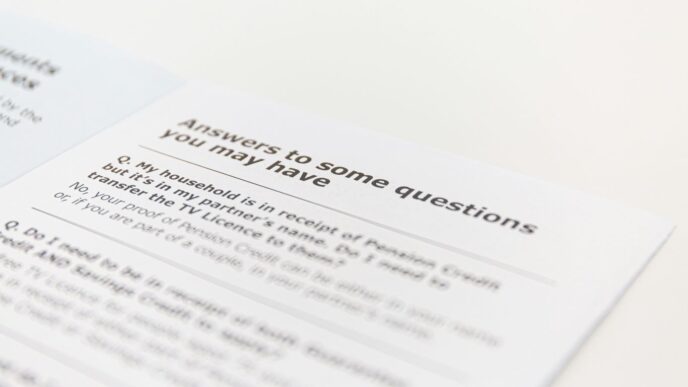So, you’ve got a job interview lined up, but maybe things have changed. Perhaps you got another offer, or this new role just doesn’t feel like the right fit anymore. It happens. Knowing how to decline an interview politely and professionally is a skill that can really help you out. It’s all about making sure you don’t burn any bridges while still being honest about your situation. This guide will walk you through exactly how to decline an interview without making a mess of things.
Key Takeaways
- Think carefully before you say no to an interview. Make sure it’s the right move for your career path.
- When you write your email to decline, keep it short, sweet, and polite. Thank them for the chance and clearly state you won’t be attending.
- Always be professional when you decline. A quick, respectful message goes a long way in keeping things positive.
- It’s smart to give a simple reason, like the job not fitting your goals, but don’t overshare. Keep the tone friendly.
- Responding quickly is super important. It shows you respect their time and helps them move on with their hiring process smoothly.
Assessing the Situation Before Declining a Job Interview
So, you’ve got an interview offer, but something feels off. Maybe you’ve got another offer on the table, or perhaps this new role just doesn’t quite fit what you’re looking for right now. It happens. Before you hit ‘reply’ to decline, it’s a good idea to take a step back and really think it through. Declining an interview isn’t something to do on a whim; it’s a decision that could affect your career path, so give it some proper thought.
Evaluating Your Current Job Offers Effectively
When you’re weighing an interview against other opportunities, it’s smart to get organized. Think about what really matters to you in a job. Is it the salary, the benefits, the company culture, or the actual work you’ll be doing? Making a list can help you see things more clearly.
Here’s a quick way to compare:
| Factor | Current Offer 1 | Interview Offer | Your Priority |
|---|---|---|---|
| Salary | $X | $Y | High |
| Benefits | Good | Better | Medium |
| Commute | 30 mins | 1 hour | Low |
| Role Alignment | Good | Excellent | High |
| Company Culture | Positive | Unknown | Medium |
Looking at it like this can really highlight where the new opportunity stands compared to what you already have or are pursuing. It helps you make a more informed choice, rather than just going with your gut feeling.
Considering Your Career Blueprint
Think about where you want to be in five years. Does this interview offer help you get there? Sometimes, even if a job isn’t perfect, it might be a stepping stone to something bigger. On the other hand, if it takes you in a completely different direction, it might be best to pass. It’s all about making sure the opportunities you pursue align with your long-term goals. You want to build a career, not just collect job titles. Making sure you’re staying informed and engaged with your industry can also help you see how different roles fit into the bigger picture. It’s about making choices that move you forward, not sideways or backward.
Crafting Your Job Interview Decline Email
So, you’ve decided not to go forward with an interview. That’s totally fine, but how you tell the company matters. You don’t want to just ghost them, right? Sending a polite email is the way to go. It shows you respect their time and effort.
Essential Components of a Professional Decline Email
When you write this email, there are a few key things to remember. It needs to be clear, polite, and to the point. Think of it like this:
- Be Prompt: As soon as you know you’re not interested, send the email. Don’t wait around. This gives them a chance to offer the interview to someone else quickly.
- Say Thanks: Always start by thanking them for the opportunity. Something like, "Thank you for offering me the chance to interview for the [Job Title] position at [Company Name]." It’s a small thing, but it makes a difference.
- State Your Decision Clearly: You need to say you’re declining. You don’t need to give a long, drawn-out explanation. A simple, "After careful consideration, I’ve decided to withdraw my application," works well.
- Keep the Door Open (If You Want): If you genuinely like the company and might be interested in other roles later, mention it. "I was very impressed with [Company Name]’s work in [specific area] and would be interested in future opportunities," is a good way to put it.
- Professional Closing: End with a standard professional closing like "Sincerely" or "Best regards," followed by your name.
Sample Templates for Politely Declining an Interview
Sometimes, seeing an example helps. Here are a couple of ways you could phrase it:
General Decline:
Dear [Hiring Manager Name],
Thank you for considering me for the [Job Title] role. After some thought, I’ve decided not to move forward with the interview process at this time. I appreciate you reaching out and wish you the best in finding a great candidate.
Sincerely,
[Your Name]
Declining Due to Another Offer:
Dear [Hiring Manager Name],
Thank you for the interview invitation for the [Job Title] position at [Company Name]. I’ve recently accepted another role that aligns more closely with my current career goals. I appreciate your understanding and hope our paths might cross again in the future. [99be]
Sincerely,
[Your Name]
Remember, you can tweak these to fit your specific situation. The main goal is to be polite and professional.
The Importance of Expressing Gratitude in Your Decline
Seriously, don’t skip the thank you part. It might seem small, but showing gratitude goes a long way. It acknowledges that they took the time to look at your application and thought you might be a good fit. Even if you’re not interested in this particular role, being thankful can leave a positive impression. Who knows? Maybe they’ll have a different opening down the road that’s a perfect match, and they’ll remember you as someone who was professional and courteous.
Maintaining Professionalism While Declining a Job Interview
When you decide to pass on an interview, how you communicate that decision really matters. It’s not just about saying no; it’s about doing it in a way that shows respect for the company and the person who reached out. Think of it as a small but important interaction that can shape how people see you professionally, even when you’re not taking the job.
Tips for Communicating Your Decision Effectively
Getting your message across clearly and politely is key. You want to be direct without being blunt, and appreciative without being overly effusive. Here are a few pointers:
- Be prompt. As soon as you know you won’t be moving forward, let the hiring manager or recruiter know. Waiting too long can be disrespectful of their time and the effort they’ve put into considering you. It also means they can quickly offer the interview slot to someone else.
- Keep it brief and to the point. You don’t need to write a novel. A few clear sentences are usually enough. Get straight to your decision, express thanks, and sign off professionally.
- Use a polite and respectful tone. Even though you’re declining, the way you phrase your message can leave a positive lasting impression. Avoid casual language or anything that might sound dismissive.
Striking the Perfect Balance in Communication
Finding that sweet spot in your message is important. You don’t want to be so vague that they don’t understand, but you also don’t want to overshare details that aren’t necessary. It’s about being informative without being overly personal.
- Provide a simple reason. A short, general explanation is often appreciated. Something like, "After careful consideration, I’ve decided to pursue other opportunities that are a closer match for my current career goals," works well. You don’t need to go into specifics about why the other opportunities are a better fit.
- Be clear about your decision. Make sure there’s no confusion about whether you’re still interested. Phrases like, "I will not be able to attend the interview" or "I have decided to withdraw my application" are direct and unambiguous.
- Express gratitude. Always thank them for their time and for considering you for the role. A simple "Thank you for the opportunity" goes a long way.
Ensuring You Don’t Burn Bridges
How you handle declining an interview can seriously affect whether you might be considered for future roles at the same company, or even within your professional network. It’s about maintaining good relationships.
- Be honest, but tactful. If you’ve accepted another offer, it’s okay to say so briefly. "I’ve recently accepted a position elsewhere" is a perfectly acceptable reason.
- Avoid negativity. Don’t criticize the company, the role, or the interview process, even if you had a bad experience. Focus on your own decision and your career path.
- Keep the door open. If you genuinely think you might be a good fit for the company in the future, you can mention that. Something like, "I hope our paths cross again" or "I wish you the best in finding the right candidate" can be a nice closing touch.
Navigating the Nuances of Declining a Job Interview

So, you’ve decided not to go forward with that interview. That happens! But how you handle it really matters. It’s not just about saying no; it’s about saying no in a way that doesn’t burn any bridges. Think of it like this: you’re closing one door, but you want to make sure the hallway remains open for future possibilities.
Common Mistakes to Avoid When Declining
Lots of people mess this up, and it’s usually for a few key reasons. You don’t want to be that person who ghosts the recruiter or sends something that sounds like a complaint. Here are some common pitfalls:
- Being too vague or overly detailed: Saying "I can’t make it" is unhelpful. But spilling all your personal reasons? Also not great. You need to find that middle ground.
- Responding too late: The company is trying to fill a role. If you wait too long to say no, they’ve likely already moved on or are holding up the process for you. That’s just not fair to them.
- Using an unprofessional tone: Even if you’re disappointed or the job wasn’t what you expected, keep your communication polite. No one likes a rude email.
- Forgetting to say thank you: They took the time to consider you. A little gratitude goes a long way.
Providing a Brief, Professional Reason
When you decline, you don’t owe anyone a novel. A short, clear reason is usually best. It shows you’ve thought about it and aren’t just blowing them off. Here are some ways to phrase it:
- "After careful consideration, I’ve decided to pursue opportunities that align more closely with my current career goals."
- "I’ve recently accepted another position that is a better fit for my long-term objectives."
- "Due to recent developments in my current role, I’m not in a position to explore new opportunities at this time."
The key is to be honest without oversharing. You want to be clear but also maintain a level of privacy.
Maintaining a Positive Tone
Even though you’re declining, try to keep the conversation positive. This is where you can really shine and leave a good impression. Think about what you can say that shows you appreciate their time and the opportunity.
- Start with a thank you. "Thank you so much for offering me the chance to interview for the [Job Title] position."
- Express regret, but keep it brief. "I’m sorry that I won’t be able to move forward with the interview process at this time."
- Wish them well. "I wish you and [Company Name] all the best in finding the right candidate."
It might seem small, but maintaining a positive tone helps keep that professional relationship intact. You never know when your paths might cross again, maybe even at a different company or for a different role. It’s always good to be on their good side. If you’re interested in how companies present themselves, you might find reading about technology journalism interesting.
Timeliness and Respect in Your Decline
When you decide to pass on an interview, getting back to the company quickly is a big deal. It shows you respect their time and the effort they put into considering you. Think about it: they’re trying to fill a role, and the sooner you let them know you’re out, the sooner they can move on to other candidates. It’s just good manners, really.
The Importance of Prompt Communication
Responding promptly is one of the most direct ways to show you value the employer’s time. If you wait too long, they might have already scheduled other interviews or even made an offer to someone else. This can create awkwardness and, frankly, isn’t a great look for you. Aim to send your decline message within a day or two of making your decision. It’s a simple courtesy that goes a long way.
Here’s a quick breakdown of why being on time matters:
- Respects their schedule: They’ve set aside time to meet with you.
- Allows them to adjust: They can quickly reach out to other candidates.
- Maintains your reputation: It shows you’re organized and considerate.
Respecting the Employer’s Time
Think about the hiring manager’s perspective. They’re juggling multiple tasks, and your interview is just one piece of a larger puzzle. By sending a clear and timely decline, you’re helping them manage their workload more effectively. It’s about being a good professional citizen. You wouldn’t want someone to waste your time, so don’t waste theirs. A quick email or phone call is usually all it takes. For instance, if you’ve decided the role isn’t the right fit after reviewing the job description more closely, letting them know right away is much better than letting them prepare for an interview that won’t happen. This consideration can even help you build a positive connection, potentially leading to future opportunities, maybe even through professional networks like LinkedIn.
Navigating Future Opportunities After Declining
So, you’ve decided to pass on an interview. That’s totally fine, but it doesn’t mean you should just disappear. Think of it like this: you’re not just saying no to this one chance, you’re also managing your reputation for the long haul. It’s about being smart and keeping things professional so that down the road, if something else pops up at that same company, or if you bump into someone from their team at a conference, they remember you positively.
Keeping the Door Open for Future Engagements
When you decline, it’s a good idea to mention that you’re still interested in the company, just maybe not for this specific role right now. You could say something like, “I’m really impressed with what [Company Name] is doing in [Industry Area], and I’d love to stay connected for future opportunities that might be a better match for my skills in [Specific Skill Area].” It’s a small thing, but it shows you’ve thought about it and aren’t just dismissing them.
Here’s a quick rundown of how to do that:
- Send a polite follow-up: A quick email thanking them for their time and reiterating your interest in the company is a good move.
- Mention something specific: If you can, point out something you liked about the company or the role. It makes your message feel more genuine.
- Express interest in future roles: Clearly state that you’d be open to other positions that align better with your career path.
Leveraging Your Professional Network
Declining an interview isn’t just about the company you’re saying no to; it’s also about the people you interacted with. These folks are part of your professional network. Keeping those connections warm means you might hear about other openings, or they might even recommend you for roles elsewhere. It’s like planting seeds for future career growth. You never know when a casual chat or a well-timed email could lead to something great later on. So, always be gracious and keep those lines of communication open. It’s a simple strategy that can pay off big time.
Wrapping It Up
So, declining an interview isn’t some big scary thing. It happens to everyone at some point. The main thing is to be polite and quick about it. Thank them for thinking of you, say you can’t make it, and maybe give a super brief reason if you want. It’s really about showing respect for their time and keeping things professional. Do it right, and you won’t burn any bridges. Plus, who knows, maybe that company will have a better opening for you down the road. It’s all about leaving a good impression, even when you’re saying no.
Frequently Asked Questions
How do I politely say no to a job interview?
To politely say no, send a quick email. Thank them for thinking of you, say you won’t be going to the interview, and give a simple reason. Keep it nice and professional.
Do I have to explain why I’m not going to the interview?
It’s nice to give a short reason, but you don’t have to go into a lot of detail. Saying you’ve found a different job or that this one isn’t quite the right fit is usually enough.
Will saying no to an interview hurt my chances with that company later?
Not if you handle it the right way! If you’re polite, thank them, and stay positive, they might consider you for other jobs in the future. It’s all about being professional.
What are common mistakes when I decline an interview?
Don’t wait too long to reply, don’t be rude, and don’t give way too much information or too little. Always say thank you – that’s super important.
When should I let them know I’m not coming to the interview?
As soon as you know for sure! This shows you respect their time and helps them find someone else faster. Being quick is key.
Is it better to email or call to say no to an interview?
Email is usually best because it’s written down and you can think about your words. But if you’ve talked a lot with the hiring person, a quick call might be okay too.














